- Home
- Stanley G. Weinbaum
The 27th Golden Age of Science Fiction Page 2
The 27th Golden Age of Science Fiction Read online
Page 2
The Jacques Futrelle MEGAPACK®
The Jane Austen MEGAPACK®
The Johnston McCulley Mystery MEGAPACK®
The Jonas Lie MEGAPACK®
The Katherine Mansfield MEGAPACK®
The Lloyd Biggle, Jr. MEGAPACK®
The Lon Williams Weird Western MEGAPACK®
The M.R. James MEGAPACK®
The Mack Reynolds MEGAPACK®
The Mary Fortune Mystery & Suspense MEGAPACK®
The Max Brand MEGAPACK®
The Murray Leinster MEGAPACK®***
The Second Murray Leinster MEGAPACK®***
The Philip K. Dick MEGAPACK®
The Rafael Sabatini MEGAPACK®
The Randall Garrett MEGAPACK®
The Second Randall Garrett MEGAPACK®
The Ray Cummings MEGAPACK®
The R. Austin Freeman MEGAPACK®*
The Second R. Austin Freeman MEGAPACK®*
The Reginald Bretnor MEGAPACK®
The Second Reginald Bretnor MEGAPACK®
The Robert Sheckley MEGAPACK®
The Saki MEGAPACK®
The Selma Lagerlof MEGAPACK®
The Stephen Crane MEGAPACK®
The Stephen Vincent Benét MEGAPACK®
The Talbot Mundy MEGAPACK®
The Third R. Austin Freeman MEGAPACK®*
The Virginia Woolf MEGAPACK®
The Walt Whitman MEGAPACK®
The Wilkie Collins MEGAPACK®
The William Hope Hodgson MEGAPACK®
The William P. McGivern Fantasy MEGAPACK®
The William P. McGivern Science Fiction MEGAPACK®
The Zane Grey MEGAPACK®
* Not available in the United States
** Not available in the European Union
***Out of print.
FREE PROMO MINI-MEGAPACKS®
Each one is only available from our web site for a single day—on Free Ebook Tuesday! Like us on Facebook to see new title announcements.
The John Gregory Betancourt MINIPACK®
The Richard Deming Crime MINIPACK®
The Charles V. de Vet MINIPACK®
The Paul Di Filippo MINIPACK®
The H.B. Fyfe MINIPACK®
The Lt. Jon Jarl of the Space Patrol MINIPACK®, by Eando Binder
The Richard Wilson MINIPACK®
The Rufus King Mystery MINIPACK®
The Sime~Gen MINIPACK®
The Spicy Mystery MINIPACK®
The Thubway Tham Thanksgiving MINIPACK®
OTHER COLLECTIONS YOU MAY ENJOY
The Great Book of Wonder, by Lord Dunsany (it should have been called “The Lord Dunsany MEGAPACK®”)
The Wildside Book of Fantasy
The Wildside Book of Science Fiction
Yondering: The First Borgo Press Book of Science Fiction Stories
To the Stars—And Beyond! The Second Borgo Press Book of Science Fiction Stories
Once Upon a Future: The Third Borgo Press Book of Science Fiction Stories
Whodunit?—The First Borgo Press Book of Crime and Mystery Stories
More Whodunits—The Second Borgo Press Book of Crime and Mystery Stories
X is for Xmas: Christmas Mysteries
THE DARK OTHER
Originally published in 1950.
CHAPTER 1
Pure Horror
“That isn’t what I mean,” said Nicholas Devine, turning his eyes on his companion. “I mean pure horror in the sense of horror detached from experience, apart from reality. Not just a formless fear, which implies either fear of something that might happen, or fear of unknown dangers. Do you see what I mean?”
“Of course,” said Pat, letting her eyes wander over the black expanse of night-dark Lake Michigan. “Certainly I see what you mean but I don’t quite understand how you’d do it. It sounds—well, difficult.”
She gazed at his lean profile, clear-cut against the distant light. He had turned, staring thoughtfully over the lake, idly fingering the levers on the steering wheel before him. The girl wondered a little at her feeling of contentment; she, Patricia Lane, satisfied to spend an evening in nothing more exciting than conversation! And they must have parked here a full two hours now. There was something about Nick—she didn’t understand exactly what; sensitivity, charm, personality. Those were meaningless cliches, handles to hold the unexplainable nuances of character.
“It is difficult,” resumed Nick. “Baudelaire tried it, Poe tried it. And in painting, Hogarth, Goya, Dore. Poe came closest, I think; he caught the essence of horror in an occasional poem or story. Don’t you think so?”
“I don’t know,” said Pat. “I’ve forgotten most of my Poe.”
“Remember that story of his—‘The Black Cat’?”
“Dimly. The man murdered his wife.”
“Yes. That isn’t the part I mean. I mean the cat itself—the second cat. You know a cat, used rightly, can be a symbol of horror.”
“Indeed yes!” The girl shuddered. “I don’t like the treacherous beasts!”
“And this cat of Poe’s,” continued Nick, warming to his subject. “Just think of it—in the first place, it’s black; element of horror. Then, it’s gigantic, unnaturally, abnormally large. And then it’s not all black—that would be inartistically perfect—but has a formless white mark on its breast, a mark that little by little assumes a fantastic form—do you remember what?”
“No.”
“The form of a gallows!”
“Oh!” said the girl. “Ugh!”
“And then—climax of genius—the eyes! Blind in one eye, the other a baleful yellow orb! Do you feel it? A black cat, an enormous black cat marked with a gallows, and lacking one eye, to make the other even more terrible! Literary tricks, of course, but they work, and that’s genius! Isn’t it?”
“Genius! Yes, if you call it that. The perverse genius of the Devil!”
“That’s what I want to write—what I will write some day.” He watched the play of lights on the restless surface of the waters. “Pure horror, the epitome of the horrible. It could be written, but it hasn’t been yet; not even by Poe.”
“That little analysis of yours was bad enough, Nick! Why should you want to improve on his treatment of the theme?”
“Because I like to write, and because I’m interested in the horrible. Two good reasons.”
“Two excuses, you mean. Of course, even if you’d succeed, you couldn’t force anyone to read it.”
“If I succeed, there’d be no need to force people. Success would mean that the thing would be great literature, and even today, in these times, there are still people to read that. And besides—” He paused.
“Besides what?”
“Everybody’s interested in the horrible. Even you are, whether or not you deny it.”
“I certainly do deny it!”
“But you are, Pat. It’s natural to be.”
“It isn’t!”
“Then what is?”
“Interest in people, and life, and gay times, and pretty things, and—and one’s self and one’s own feelings. And the feelings of the people one loves.”
“Yes. It comes to exactly the point I’ve been stressing. People are sordid, life is hopeless, gay times are stupid, beauty is sensual, one’s own feelings are selfish. And love is carnal. That’s the array of horrors that holds your interest!”
The girl laughed in exasperation. “Nick, you could out-argue your name-sake, the Devil himself! Do you really believe that indictment of the normal viewpoint?”
“I do—often!”
“Now?”
“Now,” he said, turning his gaze on Pat, “I have no feeling of it at all. Now, right now, I don’t believe it.”
&nbs
p; “Why not?” she queried, smiling ingenuously at him.
“You, obviously.”
“Gracious! I had no idea my logic was as convincing as that.”
“Your logic isn’t. The rest of you is.”
“That sounds like a compliment,” observed Pat. “If it is,” she continued in a bantering tone, “it’s the only one I can recall obtaining from you.”
“That’s because I seldom call attention to the obvious.”
“And that’s another,” laughed the girl. “I’ll have to mark this date in red on my calendar. It’s entirely unique in our—let’s see—nearly a month’s acquaintance.”
“Is it really so short a time? I know you so well that it must have taken years. Every detail!” He closed his eyes. “Hair like black silk, and oddly dark blue eyes—if I were writing a poem at the moment, I’d call them violet. Tiny lips, the sort the Elizabethan called bee-stung. Straight nose, and a figure that is a sort of vest-pocket copy of Diana. Right?” He opened his eyes.
“Nice, but exaggerated. And even if you were correct, that isn’t Pat Lane, the real Pat Lane. A camera could do better on a tenth of a second’s acquaintance!”
“Check!” He closed his eyes again. “Personality, piquant. Character, loyal, naturally happy, intelligent, but not serious. An intellectual butterfly; a dilettante. Poised, cool, self-possessed, yet inherently affectionate. A being untouched by reality, as yet, living in Chicago and in a make-believe world at the same time.” He paused, “How old are you, Pat?”
“Twenty-two. Why?”
“I wondered how long one could manage to stay in the world of make-believe. I’m twenty-six, and I’m long exiled.”
“I don’t think you know what you mean by a make-believe world. I’m sure I don’t.”
“Of course you don’t. You can’t know and still remain there. It’s like being happy; once you realize it, it’s no longer perfect.”
“Then don’t explain!”
“Wouldn’t make any difference if I did, Pat. It’s a queer world, like the Sardoodledom of Sardou and the afternoon-tea school of playwrights. All stage-settings and pretense, but it looks real while you’re watching, especially if you’re one of the characters.”
The girl laughed. “You’re a deliciously solemn sort, Nick. How would you like to hear my analysis of you?”
“I wouldn’t!”
“You inflicted yours on me, and I’m entitled to revenge. And so—you’re intelligent, lazy, dreamy, and with a fine perception of artistic values. You’re very alert to impressions of the senses—I mean you’re sensuous without being sensual. You’re delightfully serious without being somber, except sometimes. Sometimes I feel a hint, just a thrilling hint, in your character, of something dangerously darker—”
“Don’t!” said Nick sharply.
Pat shot him a quick glance. “And you’re frightened to death of falling in love,” she concluded imperturbably.
“Oh! Do you think so?”
“I do.”
“Then you’re wrong! I can’t be afraid of it, since I’ve known for the better part of a month that I’ve been in love.”
“With me,” said the girl.
“Yes, with you!”
“Well!” said Pat. “It never before took me a month to extract that admission from a man. Is twenty-two getting old?”
“You’re a tantalizing imp!”
“And so?” She pursed her lips, assuming an air of disappointment. “What am I to do about it—scream for help? You haven’t given me anything to scream about.”
The kiss, Pat admitted to herself, was quite satisfactory. She yielded herself to the pleasure of it; it was decidedly the best kiss she had, in her somewhat limited experience, encountered. She pushed herself away finally, with a little gasp, gazing bright-eyed at her companion. He was staring down at her with serious eyes; there was a tense twist to his mouth, and a curiously unexpected attitude of unhappiness.
“Nick!” she murmured. “Was it as bad as all that?”
“Bad! Pat, does it mean you—care for me? A little, anyway?”
“A little,” she admitted. “Maybe more. Is that what makes you look so forlorn?”
He drew her closer to him. “How could I look forlorn, Honey, when something like this has happened to me? That was just my way of looking happy.”
She nestled as closely as the steering wheel permitted, drawing his arm about her shoulders. “I hope you mean that, Nick.”
“Then you mean it? You really do?”
“I really do.”
“I’m glad,” he said huskily. The girl thought she detected a strange dubious note in his voice. She glanced at his face; his eyes were gazing into the dim remoteness of the night horizon.
“Nick,” she said, “why were you so—well, so reluctant about admitting this? You must have known I—like you. I showed you that deliberately in so many ways.”
“I—I wasn’t quite sure.”
“You were! That isn’t it, Nick. I had to practically browbeat you into confessing you cared for me. Why?”
He stepped on the starter; the motor ground into sudden life. The car backed into the road, turning toward Chicago, that glared like a false dawn in the southern sky.
“I hope you never find out,” he said.
CHAPTER 2
Science of Mind
“She’s out,” said Pat as the massive form of Dr. Carl Horker loomed in the doorway. “Your treatments must be successful; Mother’s out playing bridge.”
The Doctor gave his deep, rumbling chuckle. “So much the better, Pat. I don’t feel professional anyway.” He moved into the living room, depositing his bulk on a groaning davenport. “And how’s yourself?”
“Too well to be a patient of yours,” retorted the girl. “Psychiatry! The new religion! Just between friends, it’s all applesauce, isn’t it?”
“If I weren’t trying to act in place of your father, I’d resent that, young lady,” said the Doctor placidly. “Psychiatry is a definite science, and a pretty important one. Applied psychology, the science of the human mind.”
“If said mind exists,” added the girl, swinging her slim legs over the arm of a chair.
“Correct,” agreed the Doctor. “In my practice I find occasional evidence that it does. Or did; your generation seems to have found substitutes.”
“Which appears to work just as well!” laughed Pat. “All our troubles are more or less inherited from your generation.”
“Touche!” admitted Dr. Horker. “But my generation also bequeathed you some solid values which you don’t know how to use.”
“They’ve been weighed and found wanting,” said Pat airily. “We’re busy replacing them with our own values.”
“Which are certainly no better.”
“Maybe not, Doc, but at least they’re ours.”
“Yours and Tom Paine’s. I can’t see that you young moderns have brought any new ideas to the social scheme.”
“New or not, we’re the first ones to give ’em a try-out. Your crowd took it out in talk.”
“That’s an insult,” observed the Doctor cheerfully. “If I weren’t acting in loco parentis—”
“I know! You’d give me a few licks in the spot popularly supposed to do the most good! Well, that’s part of a parent’s privilege, isn’t it?”
“You’ve grown beyond the spanking age, my dear. Physically, if not mentally—though I don’t say the process would hurt me as much as you. I’d doubtless enjoy it.”
“Then you might try sending me to bed without my dinner,” the girl laughed.
“That’s a doctor’s prerogative, Pat. I’ve even done that to your Mother.”
“In other words, you’re a complete flop as a parent. All the responsibilities, and none of the privileges.”
“T
hat expresses it.”
“Well, you elected yourself, Doc. It’s not my fault you happened to live next door.”
“No. It’s my misfortune.”
“And I notice,” remarked Pat wickedly, “that you’re not too thoroughly in loco to neglect sending Mother a bill for services rendered!”
“My dear girl, that’s part of the treatment!”
“So? And how?”
“I furnish a bill just steep enough to keep your mother from indulging too frequently in medical services. Without that little practical check on her inclinations, she’d be a confirmed neurotic. One of those sweet, resigned, professional invalids, you know.”
“Then why not send her a bill tall enough to cure her altogether?”
“She might change to psychoanalysis or New Thought,” chuckled the Doctor. “Besides, your father wanted me to look after her, and besides that, I like having the run of the house.”
“Well, I’m sure I don’t mind,” observed Pat. “We’ve a dog and a canary bird, too.”
“You’re in fine fettle this afternoon!” laughed her companion. “Must’ve been a successful date last night.”
“It was.” Her eyes turned suddenly dreamy.
“You’re in love again, Pat!” he accused.
“Again? Why the ‘again’?”
“Well, there was Billy, and that Paul—”
“Oh, those!” Her tone was contemptuous. “Merely passing fancies, Doc. Just whims, dreams of the moment—in other words, puppy love.”
“And this? I suppose this is different—a grand passion?”
“I don’t know,” she said, frowning abruptly. “He’s nice, but—odd. Attractive as—well, as the devil.”
“Odd? How?”
“Oh, he’s one of those minds you think we moderns lack.”
“Intellectual, eh? New variety for you; out of the usual run of your dancing collegiates. I’ve often suspected that you picked your swains by the length and lowness of their cars.”
“Maybe I did. That was one of the chief differences between them.”
“How’d you meet this mental paragon?”
“Billy Fields dragged him around to one of those literary evenings he affects—where they read Oscar Wilde and Eugene O’Neil aloud. Bill met him at the library.”
“And he out-shone all the local lights, I perceive.”

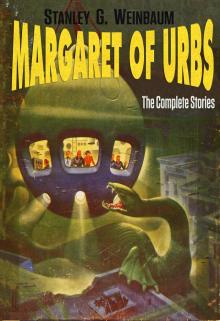 The Complete Margaret of Urbs
The Complete Margaret of Urbs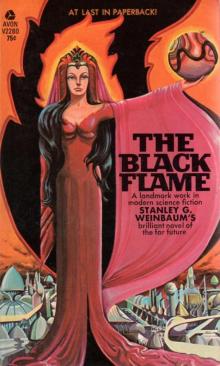 The Black Flame
The Black Flame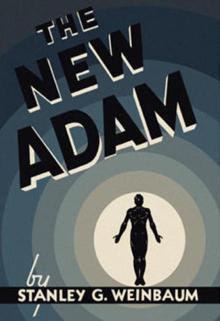 The New Adam
The New Adam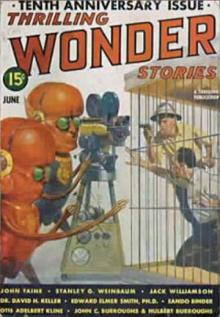 Dawn of Flame
Dawn of Flame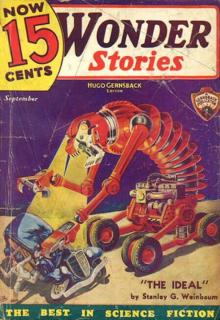 The Ideal
The Ideal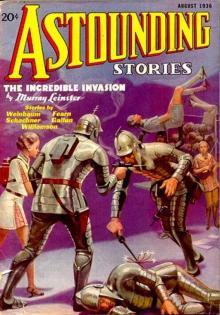 Proteus Island
Proteus Island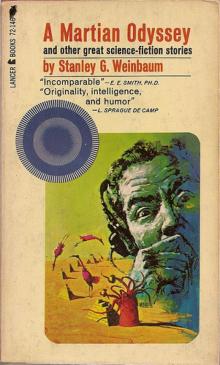 The Worlds of If
The Worlds of If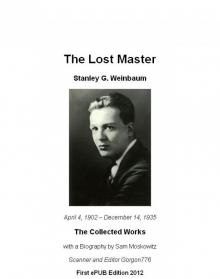 The Lost Master - The Collected Works
The Lost Master - The Collected Works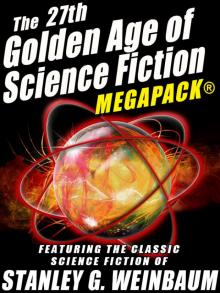 The 27th Golden Age of Science Fiction
The 27th Golden Age of Science Fiction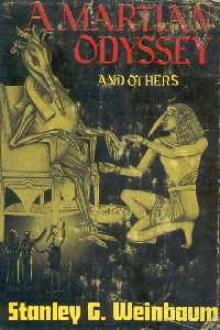 A Martian Odyssey
A Martian Odyssey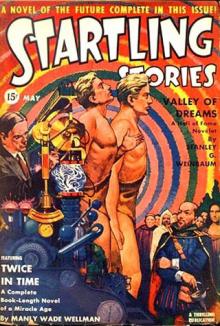 Valley of Dreams
Valley of Dreams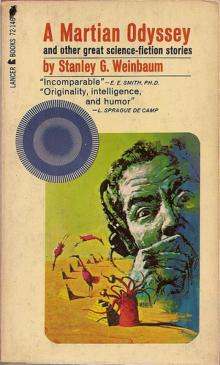 The Point of View
The Point of View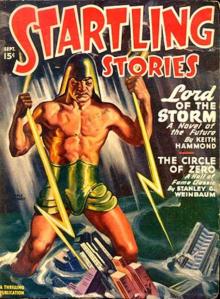 The Circle of Zero
The Circle of Zero